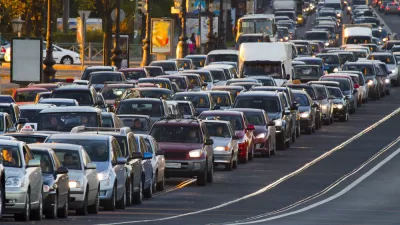Chicago shouldn't be surprised if drivers don't take to transit once its new pricing scheme is enacted. No matter the cost, most motorists won't make the switch until the city's transit system is more reliable, argues a recent column.
"With the help of a $153 million federal grant, the City of Chicago and the Chicago Transit Authority hope to get more drivers to leave their cars in the garage. The money will be used to test a plan to provide bus-only lanes during rush hour and to implement a congestion-pricing system on downtown parking. The idea is to make riding the bus more pleasant and driving a car pure hell.
The latter will be accomplished on Day One, when motorists are squeezed into fewer lanes to make room for the unleashed buses. When those drivers finally get downtown, they'll pay premium rates on parking meters, or higher taxes to park in lots and garages. A day or two of that and they'll abandon their cars and join all the happy campers cruising to work in the new bus lanes, right? Not likely.
CTA riders will tell you the buses and trains are anything but reliable. Buses arrive at the stop late-and full. Trains crawl through slow zones or park on the tracks for several minutes without explanation. Aged trains and buses are prone to breakdowns. Monday's 30-minute commute takes 55 minutes on Tuesday and longer than an hour on Friday."
"If Chicago wants to migrate drivers to mass transit, it should concentrate on making the buses and trains a better option, not making the car a worse one. Or as Alasdair Cain, senior research associate at the National Bus Rapid Transit Institute in Tampa, puts it: "Avoid implementing the stick before the carrot is there." "
FULL STORY: The $153 million traffic jam

Maui's Vacation Rental Debate Turns Ugly
Verbal attacks, misinformation campaigns and fistfights plague a high-stakes debate to convert thousands of vacation rentals into long-term housing.

Planetizen Federal Action Tracker
A weekly monitor of how Trump’s orders and actions are impacting planners and planning in America.

In Urban Planning, AI Prompting Could be the New Design Thinking
Creativity has long been key to great urban design. What if we see AI as our new creative partner?

King County Supportive Housing Program Offers Hope for Unhoused Residents
The county is taking a ‘Housing First’ approach that prioritizes getting people into housing, then offering wraparound supportive services.

Researchers Use AI to Get Clearer Picture of US Housing
Analysts are using artificial intelligence to supercharge their research by allowing them to comb through data faster. Though these AI tools can be error prone, they save time and housing researchers are optimistic about the future.

Making Shared Micromobility More Inclusive
Cities and shared mobility system operators can do more to include people with disabilities in planning and operations, per a new report.
Urban Design for Planners 1: Software Tools
This six-course series explores essential urban design concepts using open source software and equips planners with the tools they need to participate fully in the urban design process.
Planning for Universal Design
Learn the tools for implementing Universal Design in planning regulations.
planning NEXT
Appalachian Highlands Housing Partners
Mpact (founded as Rail~Volution)
City of Camden Redevelopment Agency
City of Astoria
City of Portland
City of Laramie





























